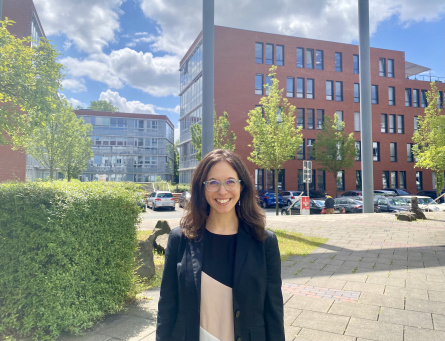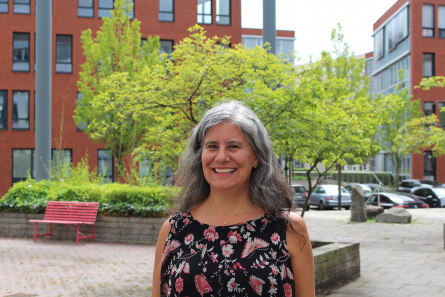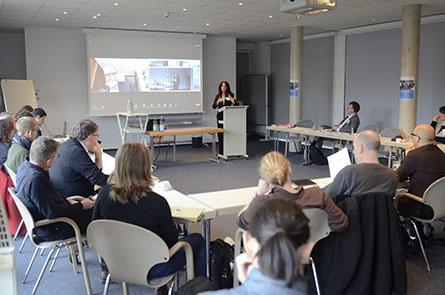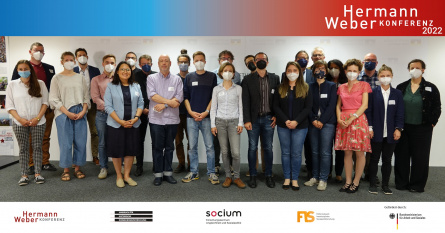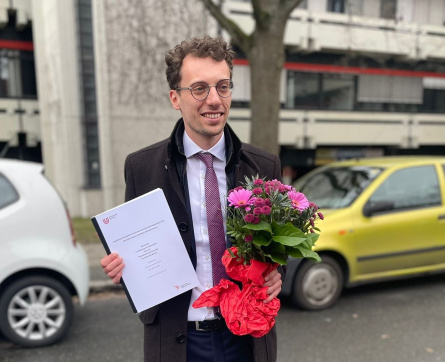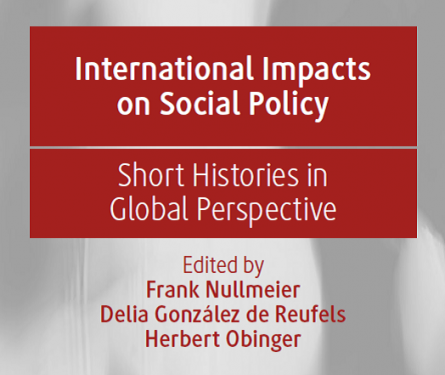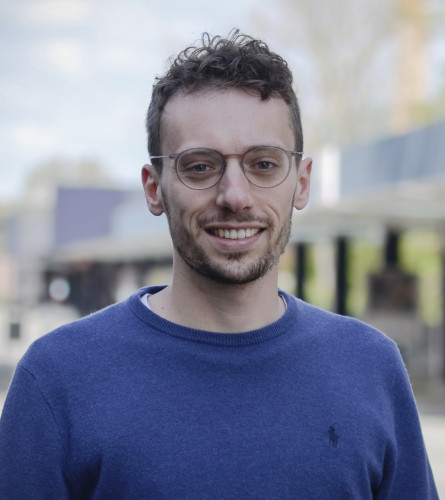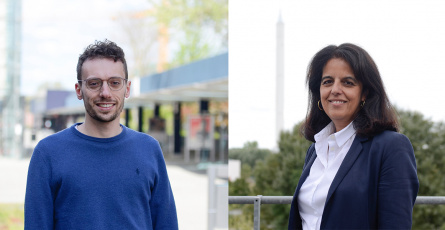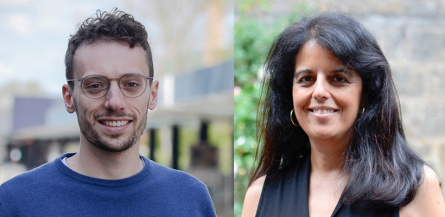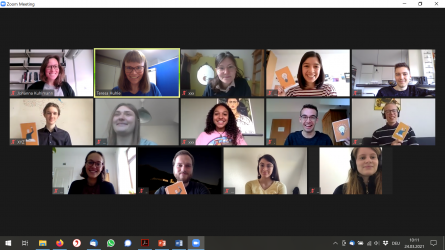Delia González de Reufels and Simon Gerards Iglesias talk about the results of project B02, how they dealt with pandemic-related constraints and what is particularly appealing about the cooperation between history and political science.You were faced with the monumental task of examining 90 years of socio-political development in three countries - how did you structure this huge task?
Simon Gerards Iglesias: There are different focal points for the three countries. I am examining the case of Argentina and have placed a focus on the International Labour Organisation (ILO), which has only existed since 1919. I have defined the following years up to the Second World War as the central period of investigation, because in this phase certain structures dominated relations between the ILO and Argentina and the foundations were laid for the future development of relations.
The period under study in the project is indeed long, yet it can be meaningfully considered because it is criss-crossed by long lines of development. What has always been important, for example, is the transnational exchange of knowledge. I also see this in Argentina from the 19th century until today: people are always looking at what is happening in Europe. And another point: we find certain path dependencies. If we look at the labour protection laws for women in Argentina and other Latin American countries, for example, we find that there were quite restrictive regulations here very early on. They were actually more restrictive than in Europe. In Argentina there were laws such as the Ley de silla, translated as the "chair law": In every industrial company, a chair had to be available for every employed woman, which was intended for recreational breaks. This was because in Argentina women's health was primarily linked to concerns about the health of mothers and thus the future generation, which is why women were allowed more rest breaks at work. Even today, this law can be found in a certain form so that attentive travellers can discover chairs everywhere in Argentina, even in the most curious places. The background, however, only becomes clear to those who can relate to Argentina's labour protection laws.
Delia González de Reufels: In the example Simon gave, one can see very clearly that social policy has left visible traces up to the present day and has responded to the concerns of the respective countries: The countries of the Cono Sur had precarious demographics in the 19th and also in the early 20th century. In Europe, where the population was growing exponentially at the time, employers may have been relatively relaxed about the fact that pregnant women were also at the machine and worked extreme hours. But it was different in the Cono Sur: there were fewer children and this was identified as a problem and taken up by social policy. The "Ley de silla" may seem bizarre today, but the future of the nation was decided at the workbench, at least when a pregnant woman was standing at it. Not surprisingly, population development was one of the lines of development along which social discussions unfolded, which can be followed very well over 90 years.
And during these nine decades, fortunately, events do not come thick and fast every year. It is rather a process of accumulation with important points of culmination. First of all, there had to be an awareness of the problem. The state did not immediately take on all problems, but rather made a selection. In Chile, our period of investigation begins in the 19th century, and in 1850 the government said for the first time that it was unacceptable for people to go to hospitals to die. These were so poorly equipped that patients had no chance of being cured. So in 1850, for the first time, there was a discussion about how government money, or more precisely: revenue from trade and customs duties, could be diverted into the development of a functioning hospital system. Until then, health had been a private matter, but in 1850, the Chilean state steps into this responsibility for the first time and begins to understand public health as a field of political action. And from that moment on, the field of health policy expands to include other elements. To observe this, the 90 years are actually ideal.
Your work is not only divided spatially, but also thematically. Delia, you mainly study the development of health policy in Chile, while Simon studies occupational health and safety in Argentina. How did this division come about?
Delia González de Reufels: All social policy fields are of course effective in all these countries. But in the case of Chile, I have noticed that many developments in occupational health and safety have emerged from health protection. In other words, from the observation that certain working conditions undermine people's health. This observation was made in the health sector, and therefore it made sense to focus on health policy.
And in the case of Argentina, we have occupational health and safety as a focus because the ILO Office for Latin America was established in Buenos Aires: After South America was initially administered from Madrid, the ILO moved to Buenos Aires with its own office and was present there. In order to be able to depict this development and its consequences in the project, we have made this separation. This gives a more complete picture than if all the developments in all the countries were traced.
Simon Gerards Iglesias: The separation also helps us to be able to apply the historiographic magnifying glass, i.e. this analytical approach, despite the large time period. This is only possible with a thematic division. On labour protection: In Argentina there was an important law in 1915 that redefined labour protection for industrial workers: it regulated compensation for accidents at work and for the first time gave the working class an important enforceable right to monetary compensation, which was a big step towards the later social insurance. Many regulations followed this law, and many bilateral agreements with European states were also concluded as a result. This example shows that social policy in the early 20th century had many transnational linkages and that rights for minority groups, such as foreign workers, were already introduced at an early stage in the development of the welfare state.
Delia González de Reufels: In Argentina, the work of a supranational organisation that looked at both areas - work and health - is becoming prominent. For health protection, we could have focused on the PAHO, founded in 1902. However, in Chile, health policy began much earlier and was closely linked to the professionalisation of medicine, which was of particular interest to us here because it was of great importance for the development of public health. So we have history before the foundation of PAHO to capture. And it is particularly important that the ILO takes up issues that have been discussed before on the part of public health. Through our division in the project, we have been able to capture this dynamic.
What other major influencing factors or mechanisms for social policy developments have you encountered in your work?
Delia González de Reufels: It was confirmed that the countries observed each other closely and also learned from each other and took up each other's initiatives. There was an intrinsic motivation to make a difference in the fields identified as important through their own measures, but there was also competition between them. Argentina and Chile observed each other very closely, even though there was a neighbour in the region, Uruguay, which was very reform-oriented and defined itself very much in terms of social policy progress. Nevertheless, the Chileans and Argentines looked to each other. And towards Europe, of course.
Simon Gerards Iglesias: Argentines looked in many directions, but always towards Europe. Argentines didn't really consider themselves Latin Americans, they always emphasised their special connection to Europe. You can find this in fashion, architecture and so on. Europe is then also an important reference point in social legislation. Spain is not seen as an old colonial power, and if it is, then as a positive one that introduced the first social laws with the so-called "Leyes de Indias". Argentina knew that it was not as industrialised as Europe, but at the same time it wanted to become so and copied many things - industrialisation, but also the related social legislation.
What is important with regard to the role of the ILO: I have the impression that the conventions and recommendations do not have that much influence on national social legislation. It is the classic problem of international cooperation: one only agrees on the lowest common denominator. As a result, many conventions are relatively weak and vague, they leave a lot of room for interpretation without really establishing a higher standard. This is clearly the case in Argentina. Here, conventions were ratified very late and only implemented in certain areas. They cherry-picked conventions for areas where there were already very sophisticated laws. As a result, the conventions usually had neither a positive nor a negative impact on Argentine legislation.
Nevertheless, the ILO was a very important actor: namely as a platform and hinge for knowledge generation in social policy. The ILO was the first and, at that time, the only organisation capable of carrying out large-scale comparative studies. It had also built up a huge library and archives that were used by Argentines. You can tell that from looking at the correspondences. Especially in the field of social security, a lot was requested from the ILO because it had built up an incredible wealth of knowledge.
You report that these countries looked very much to their neighbours and to Europe. The world was not as interconnected then as it is today. What were the ways of exchange?
Delia González de Reufels: The world was much more interconnected back then than we often imagine today. Back then, there were close connections, not by plane, but by ship. If we look at the organisations, but also the military, they were highly mobile personalities who could travel and see things in Europe for themselves. The same goes for doctors. Ideas travel with people, they also travel in writings. The actors read French, German, English and also Italian. Doctors in particular have mastered a wide range of European languages in order to be able to receive the specialist journals and to be at the cutting edge of their discipline; this at least applies to the luminaries. In the oldest medical journal, which is still published today, there was therefore always a kind of Reader's Digest that summarised what was being discussed in international journals. In this way, the entire medical profession could participate in medical advances. In some cases, one gets the impression that the authors were present when Robert Koch made another discovery; their enthusiasm about this is just as evident in the texts as the pride in their own discipline, which was constantly developing and would contribute to solving the problems of the time in Chile and elsewhere.
Simon Gerards Iglesias: There were also numerous attempts on the part of the ILO to have a stronger impact on these South American countries, to reach people and to enter the discourse. This began with Spanish-language publications in the 1920s. Then there were trips by ILO presidents, by Albert Thomas and Harold Buttler and other ILO personnel, who all travelled to Argentina, Uruguay and Chile to present the work of the ILO and to promote their organisation. On the other hand, there is interest and commitment from national authorities: The Argentine Labour Authority published papers from ILO conferences in its bulletin and their proceedings were translated into Spanish. This bulletin was read by social policy experts in Argentina, and so the debates and knowledge were carried into Argentina.
Argentina was always the most important country for the ILO to reach the whole of Latin America. This was because - as Delia says - Chile looked to Argentina and the smaller countries even more so. That's why, for example, Alejandro Unsain, a social lawyer from Argentina, was elected to a committee of the ILO, to the Executive Board. The declared feminist and socialist Alicia Moreau de Justo is also the only representative from a country in the southern hemisphere to become a member of the Commission for Women and Children. An attempt has thus been made to involve Argentinean actors, to bring them to Geneva and thus to promote exchange and the production of knowledge.
Delia González de Reufels: As a developed country, Argentina also had a special infrastructure to offer the ILO. This also applies to Chile. So in the 1930s, a large ILO meeting was held in Santiago. Chile enjoyed the fact that the world looked to Santiago. They were willing to pay for it, even in times when money was scarcer. This also applies to the Congresses of Latin American Physicians, whose idea was developed in Chile. At the same time, the country organised the first congress, which was a further development of the first Chilean medical congress. Thus, national development and transnational development were closely interwoven.
We found that there were always eventful periods of time that were driven by transnational exchange as well as by domestic developments. Neither one nor the other alone is sufficient to explain the dynamics of social policy developments. There was always a link between the transnational and national levels. Only this created a dynamic that made change possible. This is true for all social policy areas.
You have spoken of your historiographical magnifying glass, yet you are part a CRC that is mostly about political science. What was challenging about this constellation and what was particularly fruitful?
Delia González de Reufels: It is challenging, that the two disciplines are used to look at different time spans. Historical science is operating very close to the source, and sometimes you don't see the bigger picture in the beginning, but have to work it out first. We are usually in the archives for a long time before we can start to falsify our theories and make statements on the basis of sources. Our colleagues in political science are much faster. But the CRC didn't start out of nowhere. There were years of preparation, it was also about developing a common language, uniting our perspectives and learning from each other. That's what makes it so exciting for me to this day. By the way, we mostly come to similar results and complement each other very well, even though we look at things differently.
Simon Gerards Iglesias: I think political science focuses very much on methods, e.g. causal mechanisms, which we also had to acquire first. We, on the other hand, have this source perspective, and it usually takes longer until we can present results. But it is a very fruitful cooperation. I learned a lot and was able to use theories on international relations for my dissertation.
Let's move on to an unpleasant topic: How did the Corona pandemic affect your project and your research?
Delia González de Reufels: It's really tough: we have travel funds that we can't use. At the moment it is completely uncertain when we will be allowed to travel again. And unlike many colleagues, we are bound to the printed word: we have to go to the library and the archives. There are ways around it: Through a contact in a Chilean library, I was able to have some material digitised and thus get access to sources. But of course, that is only an excerpt and cannot replace weeks of archival work. Because you have to know from a distance exactly where in which serial publication something relevant can be found. And you have to be sure that no mistakes are made during digitisation and that the collections are complete.
Simon Gerards Iglesias: Fortunately, I was in Argentina two years ago, right at the beginning of my dissertation phase, and was able to collect material there. Since the beginning of the pandemic in March 2020, the ILO has not let anyone into its archives, which is a shame and ultimately a bit incomprehensible. That is a huge problem. We have hardly been able to view any ILO archive material, only that which has already been digitised. That's a lot, but it doesn't include correspondence, letters and informal reports. Yet it is precisely these unofficial sources that we as historians are so interested in. And we still hope that the archives will be opened up in time to allow us to look at them.
Despite all this, what publications can we expect from you in the coming months?
Delia González de Reufels: A working paper will soon be published that presents the results of my research and that of Mónika Contreras and puts them up for discussion. This is about the field of social housing and how it affects a particular professional group: the Carabineros de Chile. This is a militarised and centralised police force, created in 1927 through a merger of various other police forces and present throughout Chile.This new national police force was quickly able to use the social housing legislation to make itself attractive as an employer and to turn the housing crisis in Santiago around in a positive way for the members of its own unit. Housing, after all, is more than just a place to live, it has an impact on family life, on health, on the social fabric. I also have two essays in the pipeline for which I can draw on archival material I was able to collect before Corona in Chile and the Conway Medical Library in Boston.
And as a project, we will contribute two chapters to a a volume that I am one of the editors of: The volume aims to look at the breadth and dynamics of global social policy dynamics. It was fun to present some of the results of our work in a short and concise form for our countries.
Simon, when will you complete your doctorate?
Simon Gerards Iglesias: I will probably finish in late summer. It will then be published a little later, i.e. after the colloquium. I also have a lot of material and sources that I haven't used yet. Based on that, I will still write paper, but that is only due in the second half of the year.
Contact:Simon Gerards Iglesias
Prof. Dr. Delia González de ReufelsCRC 1342: Global Dynamics of Social Policy, Institut für Geschichtswissenschaft / FB 08
Universitäts-Boulevard 13
28359 Bremen
Phone: +49 421 218-67200
E-Mail:
dgr@uni-bremen.de
